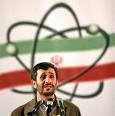The Latest from Iran (9 November): Assessing the GovernmentReceive our latest updates by email or RSS SUBSCRIBE TO OUR FEEDBuy Us A Cup of Coffee? Help Enduring America Expand Its Coverage and Analysis In The New York Times this morning
In The New York Times this morning, David Sanger publishes an article, "Iran Is Said to Ignore Effort to Salvage a Nuclear Deal", which gives half the story on the current tangled state of the negotiations over uranium enrichment.
Half the story because Sanger's story is effectively a US Government press release. Here is the narrative of unnamed officials:
The Obama Administration...has told Iran’s leaders in back-channel messages that it is willing to allow the country to send its stockpile of enriched uranium to any of several nations, including Turkey, for temporary safekeeping....But the overtures, made through the International Atomic Energy Agency over the past two weeks, have all been ignored....Instead....the Iranians have revived an old counterproposal: that international arms inspectors take custody of much of Iran’s fuel, but keep it on Kish, a Persian Gulf resort island that is part of Iran....
That proposal had been rejected because leaving the nuclear material on Iranian territory would allow for the possibility that the Iranians could evict the international inspectors at any moment. That happened in North Korea in 2003, and within months the country had converted its fuel into the material for several nuclear weapons.
This version of events intersects not only with developments around El Baradei's latest proposal --- Turkey takes Iran's reprocessed uranium from Russia and reshapes it into metal plates --- but also the reports that Russian Deputy Foreign Minister Sergei Ryabkov was in Tehran pushing a deal. The article is also notable for revealing the Kish proposal, which had not surfaced before.
The downside of the article, however, is that it misses the other half of the narrative. Yesterday Tehran's officials put out a counter-proposal for reprocessing outside Iran, in a two-stage delivery to Russia. Each shipment of uranium would be 400 kilogrammes; the total of 800 kilogrammes is about half of Iran's stock. That proposal, which could be a response to Ryabkov's intervention, may just be a case of the Iranian Government spinning out the discussions, but it is a far cry from an outright rejection.
Indeed, it is troubling that Sanger's article is riddled with distorting exaggerations. His claim that US officials "had now all but lost hope that Iran would follow through with an agreement reached in Geneva on Oct. 1 to send its fuel out of the country temporarily" overstates the situation --- Tehran's officials did not accept a plan but agreed to further technical talks in Vienna. Thus his follow-up, "Iranian officials told the energy agency on Oct. 29 that they could not agree to the deal
that their own negotiators had reached", is an unhelpful simplification.
That would not be a major problem if this was just loose reporting. The worry is that this is also the perception of US officials:
“If you listen to what the Iranians have said publicly and privately over the past week,” one senior administration official said Sunday, “it’s evident that they simply cannot bring themselves to do the deal.”
Even the most casual of EA readers would have picked up by now that there is not a single Iranian view on the negotiations. Instead, there is a heated debate within the regime on how to conduct the talks with the US. The Washington narrative in Sanger's article misses this, ignoring for example that President Ahmadinejad is pressing for a continuation of discussions despite hostility from within the Iranian Parliament and possibly from the Supreme Leader's office.
If true, this misperception carries the consequence that it may be the Obama Administration rather than Tehran which breaks off the talks. This does not mean that it is giving up a likely agreement --- again, Ahmadinejad's primary objective may be to stay at the table rather than signing a deal --- but it will lead to Iran blaming Washington for the collapse (and there will be supporters for this view, such as Erdogan in Turkey) and undercut the possibility of China and Russia supporting the harsh sanctions that the US Congress will demand.
Yet even this is secondary to the wider significance of the Administration's fuzzy view. Simply put, if the statements in Sanger's piece are accurate, Obama officials have a poor understanding of the internal dynamics in Iran after 12 June, with little comprehension of the fault-lines within the Establishment. In the end, they fail to understand that the nuclear issue is, first and foremost, a pawn in a much bigger chess match inside Iran.
 Monday, November 9, 2009 at 19:10
Monday, November 9, 2009 at 19:10 
 My only disagreement with this e-mail from an EA source is the assertion, "Nothing left to say." As we see the unfolding outcomes of the marches of last week, the writer has a lot of importance to say:
My only disagreement with this e-mail from an EA source is the assertion, "Nothing left to say." As we see the unfolding outcomes of the marches of last week, the writer has a lot of importance to say: On the surface
On the surface 